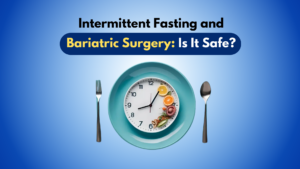Is Bariatric Surgery Safe for the Long Term? - Aastha Bariatrics

OBESITY - A DEADLY DISEASE
Obesity is an abnormal or excessive fat accumulation that presents a risk to the health of an individual.
Obesity has been a leading health concern for the last few decades. A majority of obese individuals who lose weight return or exceed their baseline weight.
MEASURES OF OBESITY
BMI: Body mass index (BMI) is a measure of body fat based on height and weight that applies to adult men and women.
The grade of obesity is decided based on the BMI a person falls under.
FORMULA FOR BMI CALCULATION:
BMI CLASSIFICATION
Nutritional status | Asian criteria |
Normal | < 25 |
Overweight | 25 – 29.9 |
Obese 1(obese) | 30 – 34.9 |
Obese 2(morbid obese) | 35 – 39.9 |
Obese 3 (super obese) | 40 and above |
WHAT CAUSES OBESITY?
- Food and Activity
- Environment
- Genetics
- Health Conditions and Medications
- Stress, Emotional Factors, and Poor Sleep
OBESITY CAN FURTHER LEAD TO:
- Type 2 diabetes
- Heart disease and stroke
- Sleep apnea
- Certain cancers
- Digestive problems
- Severe COVID-19 symptoms
HOW CAN OBESITY BE TREATED?
Diet and exercise are vital parts of the weight loss journey. The changes to diet and exercise can result in weight loss. With today’s lifestyle, most people fail to adhere to a healthy diet & exercise pattern. This leads to regaining weight.
Bariatric surgery is a well-established surgery treatment strategy for obesity. Especially after the failure of behavioral and pharmacologic weight-loss therapies. It is associated with improved comorbidities, quality of life, and survival in severe obesity.
- Anybody with BMI above 30 with or without any comorbidities can undergo bariatric surgery.
- Bariatric surgery is very beneficial to treat comorbidities including type 2 diabetes, hypertension, dyslipidemia; PCOD, hypothyroidism, OSA, and more.
WHAT IS A BARIATRIC SURGERY?
Bariatric surgery also known as weight loss surgery is a hormonal surgery in these procedure, for which the alteration in gut hormones develops as a result of the procedures’ restrictions and malabsorption. Long-term weight loss is largely achieved by altering gut hormone levels responsible for hunger and satiety, leading to a new hormonal weight set point.
TYPES OF BARIATRIC SURGERY
Laparoscopic sleeve gastrectomy: Sleeve gastrectomy, also called a vertical sleeve gastrectomy, is a surgical weight-loss procedure. This procedure is typically performed laparoscopically, which involves inserting small instruments through multiple small incisions in the upper abdomen. In this surgery, the Stomach is divided into 2 parts. The part which releases major Ghrelin i.e. Hunger Hormone. Hence the appetite is reduced and weight loss is rapid.
Gastric bypass surgery: Gastric bypass, also called Roux-en-Y (roo-en-wy) gastric bypass, is a type of weight-loss surgery that involves creating a small pouch from the stomach and connecting the newly created pouch directly to the small intestine. This results in fast and long-term weight loss.
Laparoscopic Mini Gastric bypass surgery: The Mini Gastric Bypass (MGB) is a short, simple, successful, reversible laparoscopic gastric bypass weight loss surgery. In this surgery, your stomach is made into a long slender sleeve by stapling to restrict the quantity of food you consume.
Is bariatric surgery effective long term?
All types of bariatric surgeries are effective for the long term and provide essential health benefits and weight gain doesn’t occur for a longer period.
Does bariatric surgery shorten your life?
Bariatric surgery improves life expectancy for many obese diabetic patients. It does not shorten life in any way with appropriate care being taken post-bariatric surgery.
Safety and Efficacy of Bariatric Surgery for Long Term:
Gastric bypass and other bariatric surgeries can provide long-term weight loss.
Most people who undergo bariatric surgery or weight loss surgery lose a lot of weight and maintain it over the long term.
Majority of the patients consider surgery successful because they lose weight and feel better in the long run.
Long-term benefits of bariatric surgery include that the bounce-back of weight gain is not seen as compared to the traditional weight loss methods like diet, exercise, radiation therapy, etc.
As the stomach size reduces after the surgery, the patient is not able to consume excess food than the recommended amount according to their BMI.
Patients with comorbidities have seen tremendous improvement in their health.
Pre-diabetics have reversed into non-diabetics. Diabetics have been able to reduce medication and stop insulin gradually, while some have also turned non-diabetic.
There has been a great improvement in T2DM, metabolic syndrome, and insulin resistance. This also depends on the degree of fat loss and level of physical activity at follow-up.
Hypertension and diabetes are two major causes of Kidney disease among the population. Loss of albumin in the urine due to renal malfunction is corrected after successful bariatric surgery.
The major renal function parameter, i.e. Creatinine stays stable after the successful bariatric surgery. This helps us to know the safety, efficacy, and advantages of obesity surgery or bariatric surgery.
Bariatric surgery or fat removal surgery is gender independent. Both males and females have equal benefits post-surgery.
Obesity is the root cause of conditions like menstrual abnormalities, infertility, urinary incontinence, and PCOS. Bariatric surgery removes the excess fat present in the body. All the abnormalities which were present due to excess fat come back to the normal conditions. Obesity surgery has helped many women to lead a good quality of life by improving their normal day-to-day activities and general well-being.
Bariatric surgery has improved the blood pressure levels of patients and reduced their medications.
Fertility has improved for a lot of couples post the surgery.
What are the risks of bariatric surgery?
Bariatric surgery does not have any risk as such if appropriate instructions and prescriptions given by the healthcare team are followed efficiently. Some of the patients may experience nausea, dizziness, and few symptoms post-bariatric surgery which is easily managed by the bariatric healthcare team.
Conclusion
Bariatric surgery or fat removal surgery has been a boon to all those who have been suffering from this disease named “Obesity.” It is a completely safe and reliable procedure to go ahead with. Bariatric surgery or the obesity surgery is the safest surgery to undergo.
Read also; The Cost of Bariatric Surgery in India
Why We Are?
- Asia's Trusted Bariatric Center
- Centre of Excellence
- Patient Trusted Highly Volume Bariatric Center in Mumbai
- EMI, Cashless & Mediclaim Facilities are Available
- Daily Patients Follow-up after Bariatric Surgery
- Patient Support Group Every Month
- Obesity Awareness Program
- Available with Latest Technologies
- 18+ Experience in Weight Loss Bariatric Surgery
- 300+ Weight Loss Diet Plan & Recipes
- Highly Trained & Experienced Bariatric Nutritionist
- Patient WhatsApp Chat Group
- & Many More
Medically reviewed by Dr. Manish Motwani, Bariatric & Metabolic Laparoscopic Bariatric Surgeon — Curated by Ruchika Bachwani






